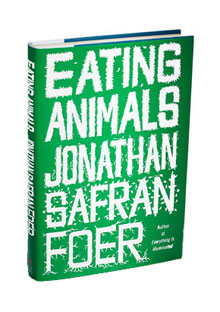So much of our lives revolve around food and, even if you don't want to hear it, there are a ton of things that you need to know about your food options, before you decide who to give your money to. "Food" isn't what it used to be. Literally. If I tried to explain details of the so-called-"modern" food industry to my Gramps, he would a. not understand at all, and b. think I was bullshitting him. He is an ex-farm boy from Saskatchewan and he assumes food is still manufactured with similar care and animal husbandry continues in a similar way to that of the traditional family farm.
Jonathan Safran Foer's book, Eating Animals, is a really freakin' awesome investigation into the difficult decision we make every meal about whether or not to include animals on the menu. Foer is a likable guy who battled with vegetarianism and omnivory. And you are all getting this book from me for Christmas. Or you would be, if I could afford to do that.
Let's discuss.
We care most about what's close to us, and have a remarkable easy time forgetting everything else. We also have a strong impulse to do what others around us are doing, especially when it comes to food. Food ethics are so complex because food is bound to both taste buds and taste, to individual biographies and social histories.
We can recognize parts of ourselves in [animals]... but then deny that these animal similarities matter, and thus equally deny important parts of our humanity. What we forget about animals we begin to forget about ourselves.
The eat with care ethic didn't become obsolete over time, but died suddenly. It was killed, actually.
No one fired a pistol to mark the start of the race to the bottom. The earth just tilted and everyone slid into the hole.
Factory farming is the last system you'd create if you cared about about sustainably feeding people over the long term.
The most ecologically sound farms raise plants and animals together. They are modeled on natural ecosystems, with their continual and complex interplay pf flora and fauna.
Some thoughts on intelligence.
Dr. Stanley Curtis, an animal scientist friendly to the industry, empirically evaluated the cognitive abilities of pigs by training them to play a video game with a joystick modified for snouts. They not only learned the games, but did so as fast as chimpanzees.
Fish build complex nests, form monogamous relationship, hunt cooperatively with other species, and use tools. They recognize one another as individuals (and keep track of who is to be trusted and who is not)... They have significant long-term memories, are skilled in passing knowledge to one another through social networks, and can also pass on information generationally.
Eat your garbage.
We're messing with the genes of these animals and then feeding them growth hormones and all kinds of drugs that we really don't know enough about. And then we're eating them. Kids today are the first generation to grow up on this stuff, and we're making a science experiment out of them.
If consumers don't want to pay the farmer to do it right, they shouldn't eat meat.
In the world of factory farming, expectations are turned upside down. Veterinarians don't work toward optimal health, but optimal profitability. Drugs are not for curing diseases, but substitutes for destroyed immune systems. Farmers do not aim to produce healthy animals.
Living in a shithole.
All told, farmed animals in the United States produce 130 times as much waste as the human population - roughly 87 000 pounds of shit per second. The polluting strength of this shit is 160 times greater than raw municipal sewage. And yet there is almost no waste-treatment infrastructure for farmed animals.
Communities living near these factory farms complain about problems with persistent nosebleeds, earaches, chronic diarrhea, and burning lungs.
In only three years, two hundred fish kills - incidents where the entire fish population in a given area is killed at once - have resulted from factory farms failures to keep their shit out of waterways.
"Clear-cutting" the oceans.
Trawling, almost always for shrimp, is the marine equivalent of clear-cutting rainforest.
Although one can realistically expect that at least some percentage of cows and pigs are slaughtered with speed and care, no fish gets a good death. Not a single one. You never have to wonder if the fish on your plate had to suffer. It did.The Rundown.
We can't plead ignorance, only indifference. Those alive today are the generations that came to know better. We have the burden and the opportunity of living in the moment when the critique of factory farming broke into the popular consciousness. We are the ones of whom it will be fairly asked, What did you do when you learned the truth about eating animals?
Image from Google Images. Quotations from Eating Animals by Jonathan Safran Foer. New York: Back Bay Books, 2009. Bold emphasis in the final quote added by yours truly.





comment comment comment! good one snow white.
ReplyDelete